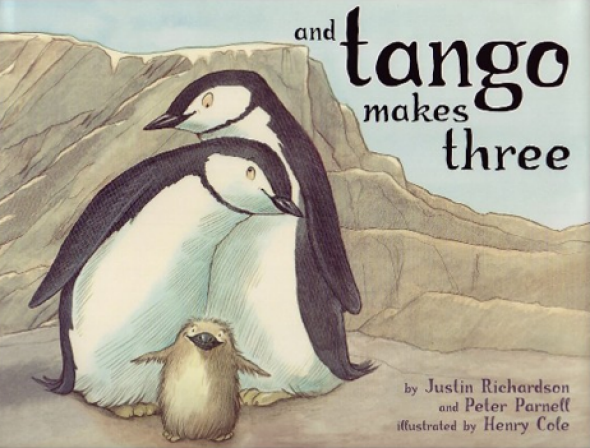This week, the National Library Board of Singapore banned two gay-themed children’s books from its public libraries, claiming that they did not meet “pro-family” standards. It’s tempting to ridicule Singapore, which still criminalizes gay sex, for outlawing such benign books, one of which tells the true story of gay penguins. But Singapore’s strange censorship should serve as an important reminder that conservatives in America have long pushed a similar campaign to remove books featuring “homosexuality” from libraries around the country.
According to the American Library Association’s list of frequently challenged books, “homosexuality” is one of the grounds on which library books are most frequently petitioned for removal. The Color Purple and The Perks of Being a Wallflower often join And Tango Makes Three—the gay penguins book—on the list of most-challenged books due to their gay content, along with Maya Angelou’s I Know Why the Caged Bird Sings. Because these censorship attempts involved public libraries, they were obviously barred by the First Amendment. But it’s safe to assume that school libraries, which face less oversight and enjoy fewer free speech protections, are routinely pulling these books from their shelves.
Conservative censorship of LGBTQ books, which begins and ends with an obvious anti-gay bias, is easy to condemn. But “liberal” censorship—outlawing certain modes of expression to further ostensibly progressive causes—can be just as easily manipulated to muffle gay-related speech. The most alarming example comes from Canada, where the left-leaning Supreme Court declared in 1992 that depictions not only of “sex with violence” but also of “sex without violence” that is “degrading and dehumanizing,” particularly toward women, could be outlawed as obscene.
Radical feminists cheered the outcome as a triumph for equality—until, six weeks later, Toronto police confiscated the lesbian magazine Bad Attitude from a bookstore and charged the store’s owner with obscenity. The high court upheld the charges. Later that year, an Ontario court permitted the censorship of all gay and lesbian magazines, holding that the representation of gay sex is inherently “degrading and dehumanizing.” Its reasoning? Same-sex intimacy is inherently devoid of “any real meaningful human relationship.” Under this rationale, Canadian customs officers began tracking every package sent to gay and lesbian bookstores across the country, confiscating the contents, and charging sellers with obscenity. Gay rights groups first challenged the confiscations, but they eventually ran out of money and gave up their legal battle. The law remains in effect today.
This horror story didn’t happen in Singapore or Saudi Arabia. It happened in a liberal democracy much like the United States, with an admirable history of gay rights and near-total legal equality for LGBTQ citizens. Yet once the government was handed the power to ban books, it swiftly began crushing gay-related expression. This is how it always happens, and how it always will happen. From children’s books to lesbian magazines to The Color Purple, the state, once empowered with censorship, immediately sets its sights on LGBTQ ideas. Laugh at Singapore, shrug at Canada, but remember: When censorship is permitted, gay books will be the first to go.
